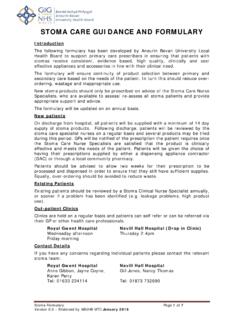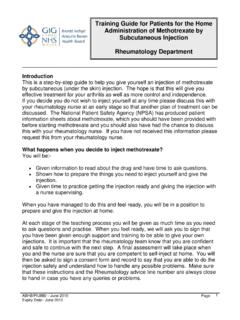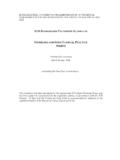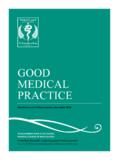Transcription of National occupational standards for the practice of public ...
1 Better SkillsBetter JobsBetter HealthNational occupational standards for thepractice of public health guide March 2004 Skills for health , Guide to the National occupational standards for the practice of public health , March 200402 These National occupational standards describegood practice in the practice of public health . Thestandards have been developed as a means ofimproving the capacity and capability of the publichealth workforce. The standards make the linksbetween what needs to happen to improve people shealth and what individuals need to do to contributeto this effort effectively. These standards have beendesigned to be used across service, organisationaland individual levels across all sectors - to developservices, plan workforces, guide practice and themanagement of people, and form the basis ofeducation, training and qualifications. Many practitioners and agencies willingly gave theirexpertise and time in the development of thesenational occupational standards .
2 Without theircontribution it would not have been possible toproduce these standards nor have taken forwardthis work on a multi-agency and multi-disciplinarybasis. The standards were approved as UK-wide nationaloccupational standards by the education regulatoryauthorities the Qualifications and CurriculumAuthority (QCA) and the Scottish QualificationsAuthority in February 2004. This approval atteststo the quality of these standards and theirappropriateness for all who contribute to improvingthe health of the public , wherever they work andwhatever their work role. The project to produce these National occupationalstandards was led by Skills for health , the UK-wideSector Skills Council for health . The project wascommissioned and overseen by the four UK HealthDepartments. In addition a Core StakeholdersGroup, including representatives of regulatorybodies and professional bodies as well as the fourgovernment health departments, advised on theprocesses and outcomes of the work.
3 The team ofindependent consultants who produced theoutcomes were: Lindsay Mitchell of Prime R&D,Thelma Harvey and Barbara contribution of the many individuals andagencies involved in the development of thesestandards is gratefully acknowledged. March 2004 Acknowledgements Introduction01 What are the National occupational standards for the practice of public health ?05 Why were the standards developed?05 Who do the National occupational standards apply to?05 What are the benefits of the standards ?05 How can the standards be used?05 What are the National occupational standards like?05 How do the standards relate to the standards for public health specialists?05 Who oversaw the development of the standards ?05 When were the standards developed?0502 What is covered by the standards for the practice of public health ?06 What is public health ?06 What do the National occupational standards cover?
4 07 Who is involved in improving the health of the public ?0903 What do the standards for the practice of public health look like?10 How are the National occupational standards structured?10 What is included in the National occupational standards for public health ?1004 How can the National occupational standards be applied?2105 How can the National occupational standards for the practice of public health be used?22 Who will use the National occupational standards ?22 What are the benefits of these National occupational standards ?22 How do these National occupational standards relate to other competences/frameworks?22 What are the different uses of the standards ?23 Have you any examples of how the standards have been used?2606 How can I provide feedback on the National occupational standards ?4207 What is on the CD-Rom?43 Appendix A Example of the structure of a National occupational standard44 ContentsSkills for health , Guide to the National occupational standards for the practice of public health , March 200403 Skills for health , Guide to the National occupational standards for the practice of public health , March 200404 health is more than the absence of disease andbeing healthy is a positive state of wellbeing, onewhich is promoted through broad engagement ofmany groups and interests within society.
5 To behealthy requires individuals to engage in their healthas much as it requires healthy and sustainableenvironments and well trained professionals. DerekWanless recognised this when he said in his report: Adequate workforce capacity will need to becreated with appropriately broad skill more of the activity will be concernedwith monitoring, interpreting data, identifying risk,educating people and motivating them to changebehaviour, the required mix of skills will change. Derek Wanless, Securing good health for theWhole Population: Final Report, February 2004 The publication of National occupational standardsfor public health is a timely response to the growinginterest in health and wellbeing and the challenge ofdeveloping the workforce to promote health andaddress the challenges of health inequalities. Thepublic health workforce needs to include a diversemix of people from different professional andpractice backgrounds working across all sectors ofthe economy education, transport, housing,agriculture, and the environment.
6 Some will workdirectly in the health sector; the work of others willindirectly impact on health . Whatever thebackground, the occupational standards for thepractice of public health have been designed toassist with developing services, planningworkforces, guiding practice and managing form the basis of education, training andqualifications, making links between practice andimpact on health . The standards arecomplementary to the standards for with any developing area, these nationaloccupational standards for the practice of publichealth are not set in stone but provide a startingpoint. Feedback of your views will help us refinethem in the light of experience and practice , and wehope that they will be a useful tool to support broadengagement in improving health for all populations,particularly the vulnerable and excluded. Sian GriffithsPresident of the Faculty of public HealthIntroductionSkills for health , Guide to the National occupational standards for the practice of public health , March 2004 Why were the standards developed?
7 The National occupational standards for thepractice of public health were developed as one keypart of developing the capacity and capability of thepublic health workforce. The standards are seen asan essential component of improving the health ofthe public identified as of vital importance by eachof the four UK countries. Who do the National occupational standardsapply to?Anyone who works to improve the health of thepublic including those who work in: the NHS, localauthorities, the voluntary sector and independentsector across the UK. What are the benefits of the standards ?The standards provide a coherent overview ofpublic health . They have been developed from amulti-disciplinary and multi-sectoral approach andhave had a wide range of different practitionersfrom different agencies involved in theirdevelopment. The standards provide a sharedlanguage for partnership working that is capable ofbeing applied to different contexts and differentpractitioners.
8 How can the standards be used?The standards can be used in a variety of ways: bya number of agencies working in partnership to planservices and workforce development, byorganisations to develop, for example, jobdescriptions, and by individuals to identify learningneeds and interests. What are the National occupational standardslike?The standards focus on good practice in specificareas of work. They are fairly broad and general innature. For example they look at primary preventionfunctions but do not look at each of these functionsin detail nor how they are undertaken by differentprofessional/ occupational groups ( childprotection, immunisation, infection control). How do these standards relate to the standardsfor public health specialists?These National occupational standards for thepractice of public health use the same ten areas asthe standards for specialist practice .
9 However theyare in greater detail than the specialist standards asthey describe good practice in the detailed workthat needs to take place in each of those areas ofpractice, whereas the standards for public healthspecialists show how they draw from, andcoordinate across, all of these different areas ofpractice. Who oversaw the development of thestandards?The development was funded by the four UKGovernment health Departments and the EducationRegulatory Authorities the Qualifications andCurriculum Authority (QCA) and the ScottishQualifications Authority (SQA). The project todevelop the standards was led by Skills for health ,the Sector Skills Council for the health bodies, professionalbodies/associations and employing organisationsguided the work. When were the standards developed?The development of these National occupationalstandards followed on from the development of thestandards for public health specialists.
10 Thedevelopment work took place during 2002-2003and there was a UK-wide consultation in standards were formally approved by keystakeholders in the sector in the autumn of 2003and quality approved as National occupationalstandards by QCA and SQA in February 2004. 05 What are the National occupationalstandards for the practice of publichealth?01 Skills for health , Guide to the National occupational standards for the practice of public health , March 2004 What is public health ?These standards /competences describe the qualityof work that is expected of people who work toimprove the health of the public in the UK whoare engaged in the practice of public purpose of public health is to:improve the health and wellbeing of thepopulationprevent disease and minimise its consequencesprolong valued life reduce inequalities in health :takes a population perspectivemobilises the organised efforts of society andacts as an advocate for the public s healthenables people and communities to increasecontrol over their own health and wellbeingacts on the social, economic, environmental andbiological determinants of health and wellbeing protects from and minimises the impact ofhealth risks to the populationensures that preventive, treatment and careservices are of high quality, based on evidenceand are of best value.

















